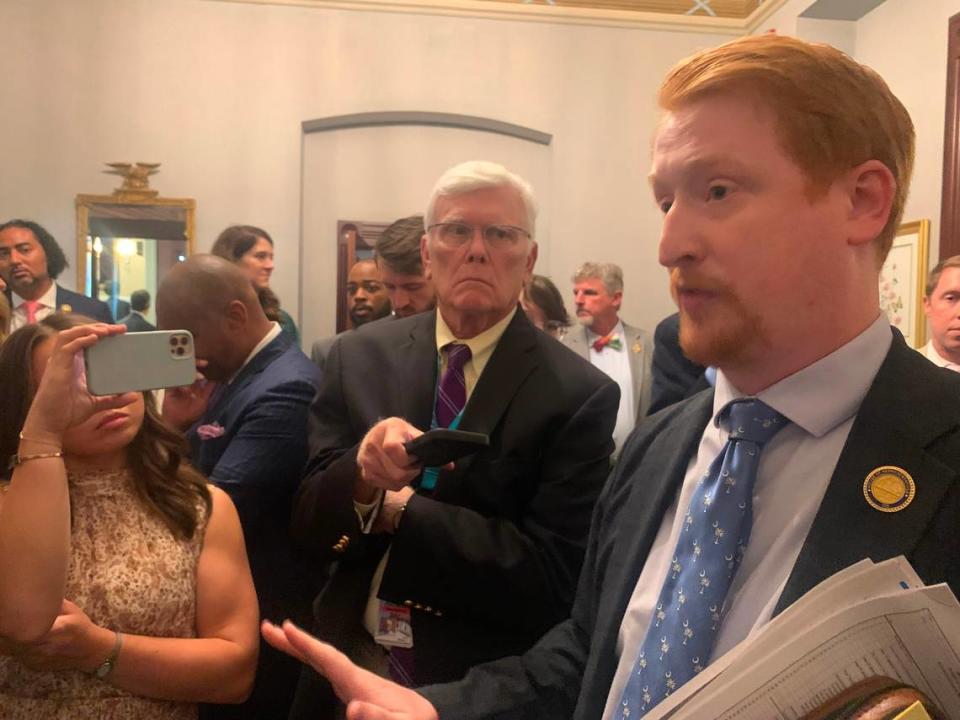GOP vs Freedom: SC House primary elections features 32 races between conservative caucuses
For much of the last three years of legislative sessions, hard-line conservative state House members have clashed with Republicans on whether they’re conservative enough.
Now those clashes will play out at the ballot box.
More than 30 seats represent the battlefield for the Republican Caucus versus hard-line conservative Freedom Caucus in Tuesday’s legislative primary elections. The outcomes of these primary races may influence how conservative the House gets, how well the chamber functions, and whether hard-line members gain or lose influence.
Because most state Legislative districts are drawn in favor of one party over another, the winners of primary races often decide who will win November’s general election.
In the June 11 primaries, 32 districts feature Republican-held seats with a GOP-caucus aligned candidate against a Freedom Caucus aligned candidate.
Of the 32 seats that represent the Freedom Caucus-GOP caucus battleground, 14 are held by the Freedom Caucus members and 18 are held by those in the House GOP caucus.
The Freedom Caucus holds 17 seats in the state House, but three of those districts only have one candidate running in this year’s election and aren’t counted toward the battlefield total.
Elections in these districts are the latest chapter of the contentious disagreements between members of the two caucuses.
The battle has led to more than $1.5 million in spending in the districts and a flood of mailers trying to mold incumbents and challengers records to voters.
The two House factions may not have too much that truly divides them, even when examining voting records.
And yet, while House Republicans have become more serious in their pursuit to keep Freedom Caucus members out of their seats, and vice versa, GOP leadership and allies continue to describe the group under a variety of names, downplaying them publicly while raising alarm bells behind the scenes.
For House GOP leadership, these races are about substance over style, and being able to disagree with respect.
“The key to it is the people of South Carolina. Do they want people that want to come to Columbia and get along, work together, create good legislation, but we do it in a civil manner? Or do they want chaos and confusion?” said House Majority Leader Davey Hiott. “I think that’s what it all boils down to because that’s the difference between the two groups.”
Even before filing, Hiott said the job was to protect House members, and he and the GOP would do so, even if it wasn’t by social media.
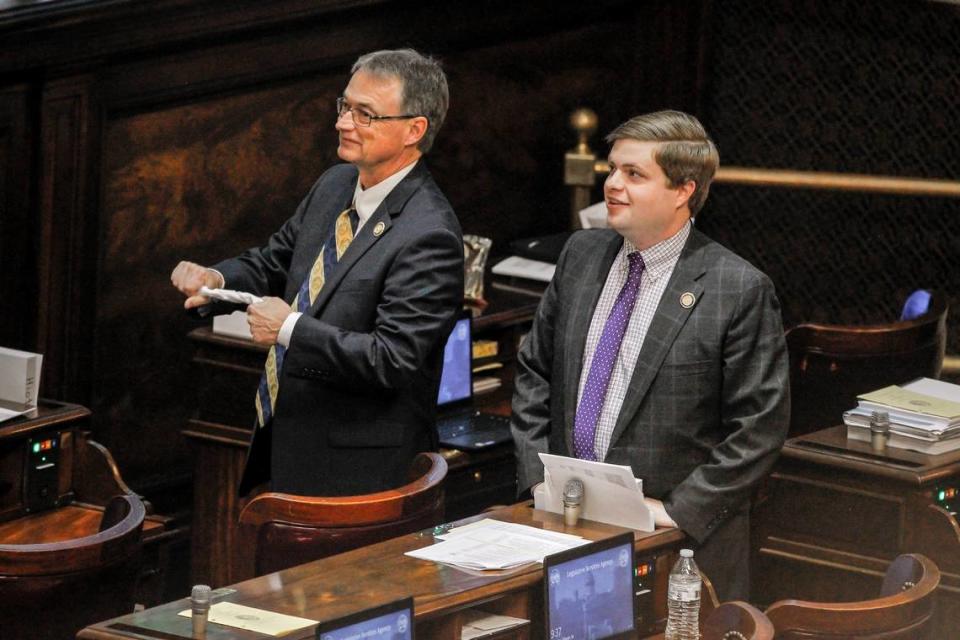
House Freedom Caucus Chairman Adam Morgan, who is running for Congress and won’t return to the State House, said his caucus sees the races as candidates “fighting against the establishment.”
“We have a stranglehold of special interests over both chambers here in Columbia and we have outsiders who have really taken a hatchet to that stranglehold and it’s time to have people who really represent their constituents and fight against ethics abuses, cronyism and government waste,” Morgan said.
Lexington County state Rep. R.J. May, vice chair of the Freedom Caucus, is confident that the Freedom Caucus is coming back, and stronger than before, predicting its membership will grow from 17 members to 25 members.
The stakes are high, but not necessarily for the Freedom Caucus, May added. It’s about the future of the state and a “beacon of conservative policy,” May and Freedom Caucus members are pushing for. The conservative movement is not just about one person, it’s a collective effort.
“The swamp is doing everything they can to eradicate the conservative movement in South Carolina,” May said. “More Freedom Caucus members means a smaller, more accountable state government that is actually doing the work of the people as opposed to the bidding of lobbyists and special interests. On the flip side of that, fewer Freedom Caucus members means the return to the failed status quo.”
Campaigning: Door knocking, mailers and spending
Because of gerrymandering in how legislative districts are drawn, the outcome of the primary election in a district may end up determining who wins the general election in November.
With that in mind, both caucuses have focused their efforts and spending on winning these races.
May said the caucus has done as much as they can to help their members.
“We obviously don’t have as large of a checkbook as the swamp’s donors, but we’re confident we can make that up with grassroots shoe leather,” May said. “And I think voters are smart enough to see through the blatant lies and false attacks from RINO (Republican in name only) leadership and their liberal allies.”
In terms of where members are being attacked, May said you can tell where “the swamp” wants to make a particular impact. He said he expected attacks but thought the House GOP would at least have some integrity about the attacks, referencing fliers that were sent out about him and State Rep. Jay Kilmartin that he said were false.
“Myself, April Cromer, Josiah Magnuson, Joe White, it seems that they invested quite heavily in the four of us,” May said. I shouldn’t say invested in us but invested in taking us out. We share being attacked on the radio and the mailbox, online text messages, print media, TV.”
May said the Freedom Caucus has mostly focused on digital and text messaging campaigning, while he noticed the attacks against himself and the other Freedom Caucus members were mostly mailers.
The mailers, he added, were mostly coming from third-party groups, and a majority coming from the Palmetto Truth Project, he said.
“They self admitted that they sent out over a million pieces of mail,” May said.
When asked about concerns from House Republicans being vulnerable to Freedom Caucus members or candidates, House GOP strategist Walt Whetsell said he’d reference one of Strom Thurmond’s favorite quotes, ‘there are only two ways to run a campaign, unopposed or scared.’
“There are 14 incumbent House caucus Republicans who have had somewhere between eight and 12 pieces of negative mail land on them from various and sundry Freedom Caucus affiliated groups,” said Whetsell, who is president of Starboard Communications. “You know, tons of text messages and paid Facebook ads. I think it is a legitimate battlefield kind of on all fronts.”
Whetsell said it’s clear that the members of the South Carolina Freedom Caucus are pining for the same kind of chaos and Republican infighting that’s been observed in Washington, D.C.
“Well, it’s unfortunate, right? We’ve seen what the results of that are, which is accomplishing almost nothing,” Whetsell said. “In terms of things actually getting done and progress being made, sure there’s a concern.”
Hiott said the GOP caucus has focused the last two years preparing.
“We knew it was coming. We knew it’s gonna be a different kind of campaign” Hiott said.
Freedom Caucus candidates have spent more than $562,000 on their campaigns through May 22, according to state ethics commission reports. But overall they trail candidates that align with the GOP caucus, who have spent more than $1 million through May 22 on their campaigns.
These figures, however, do not include spending by third-party groups that have interest in certain elections.
The battle between the two camps has played out in campaign fliers as voters’ mailboxes have been inundated with mailers from candidates but also third party groups.
Campaigning against the Freedom Caucus includes work by the Realtors association and the Palmetto Truth Project, which has connections to Whetsell of Starboard Communications, the communications strategy firm for the House GOP Caucus, according to media reports.
Kilmartin, a Freedom Caucus member from Lexington County, acknowledged the spending difference is a challenge the Freedom Caucus will have to overcome.
“It’s a concern because they have deep pockets,” Kilmartin said.
Kilmartin also said he’s been encouraged by the feedback he’s received while meeting voters on doors on the campaign trail.
“The primary voter is going to be, I think, motivated to get rid of the norm down here. They follow more than most. They’re in tune,” Kilmartin said. “Knocking on doors I’m getting a lot of good feedback about the Freedom Caucus.”
Morgan is encouraged by the signs for Freedom Caucus incumbents he sees when he’s out campaigning for Congress. Several of the State House districts in play during the primary overlap with the 4th Congressional District.
“I would assume most of the current incumbent Freedom Caucus members win by large margins,” Morgan said. “The signs are everywhere and … none of them are going to be in trouble. I would assume that you will see big flips from more RINO establishment members.”
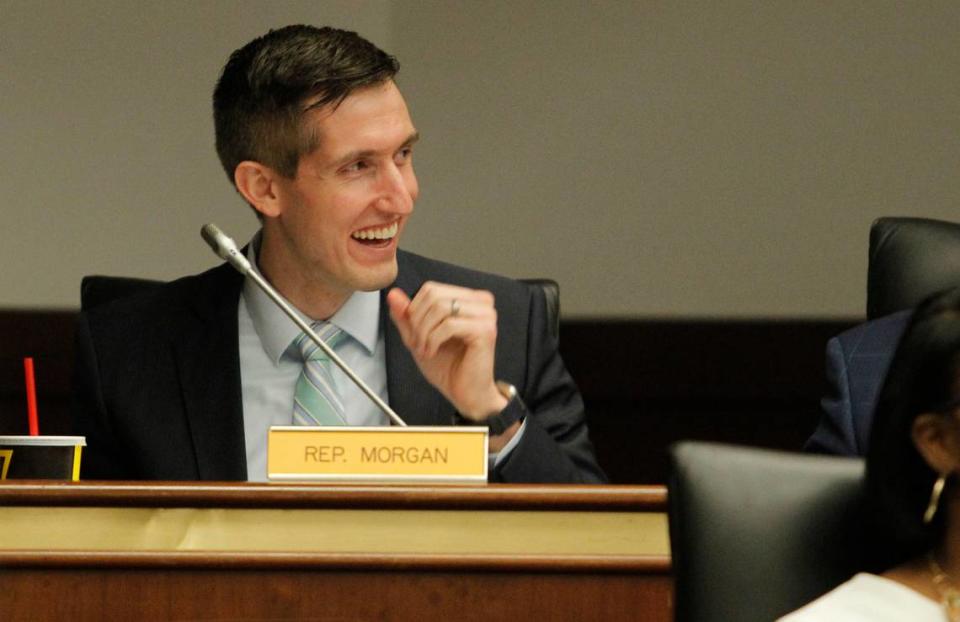
Disagreements lead to chaos at times
The dysfunction and disagreements between the GOP and Freedom caucuses has led to public spats, including fights during budget debates, a proposed amendment over whether there should be a definition of a woman in a law declaring an annual Women in Hunting and Fishing Awareness Day, and in a debate on a bill to merge the state’s health care agencies.
The extended health care agency merger debate on the last days of session led to the bill dying before the mandated adjournment.
House Speaker Murrell Smith conceded during a news conference on May 9, the last day of the formal session, that the disarray and dysfunction seen in Congress has percolated into the South Carolina State House.
“It’s not lost on me that yesterday you see chaos created in Washington, D.C., and the same agents who have been imported down to South Carolina tried to create chaos on our floor and try to kill bills to get attention,” Smith said. “This is about making a difference and someone says this is about governing, and I sure hope that we get back to governing and quit trying to try and get that social media attention and clickbait.”
Smith said previous practices of disagreeing while respecting one another has been “thrown out the window.”
“We’ll have an election and people will have a dichotomy that they can choose from whether they want someone that wants to make noise or they rather elect someone that wants to make a difference,” Smith said. “And so I think we will get there and I have a belief that says as a South Carolina go choose people who represent their values, who want to improve South Carolina.”
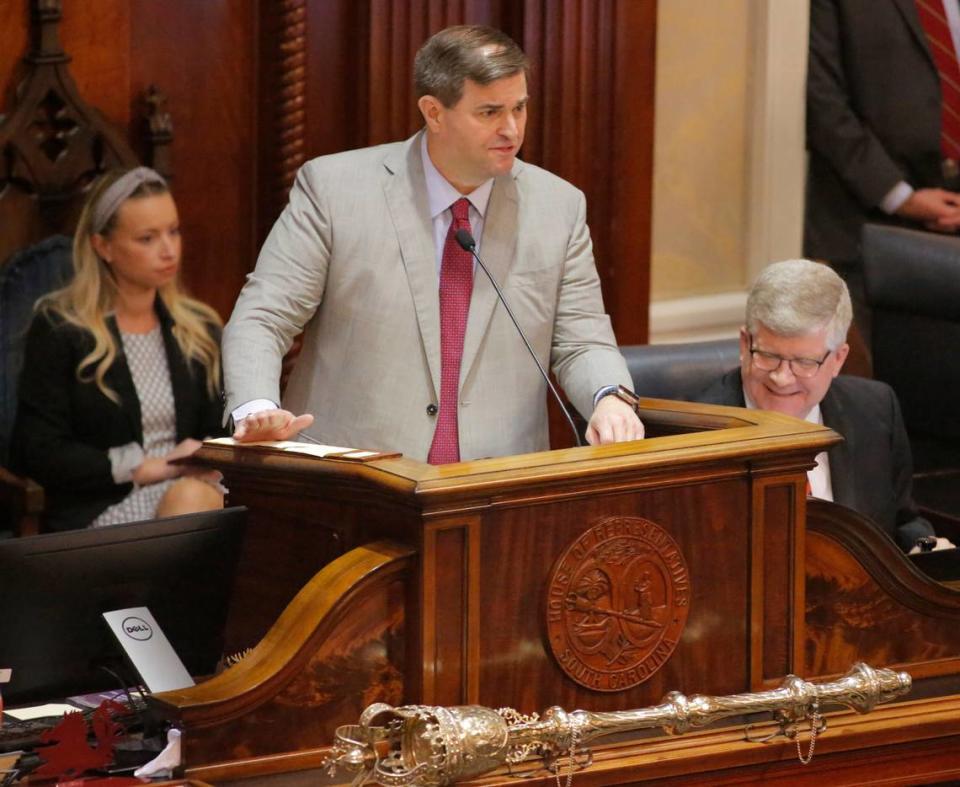
Differences aside, votes agree more than disagree. The groups may, too.
While the fighting sometimes spans into personal attacks on the House floor, the result of what is and isn’t in legislation. Even in the primary races, Freedom Caucus candidates and House Republican candidates, while they may not admit it, find themselves arguing the same points.
Freedom Caucus members often end up voting with the House GOP.
In analysis of votes in the House chamber, R.J. May and Ryan McCabe voted with Davey Hiott 58% of the time.
State Rep. Jay Kilmartin voted with Hiott 75% of the time. State Rep. April Cromer voted with Hiott 77% of the time.
State Rep. Paula Calhoon, a House GOP caucus member running against a Freedom Caucus aligned candidate, voted with Hiott just under 71% of the time.
“A lot of the things that the House Republican caucus has touted as their issues, you see the Freedom Caucus people at the end of the day voting for everything we put up. So it ain’t got nothing to do with policy,” Hiott said. “They put up gotcha amendments trying to have bumper sticker politics and things like put on social media in ways that they can kind of tear into the establishment as they like to call us. It’s all about presentation.”
Calhoon, a Lexington County Republican, acknowledged disagreements happen on amendments on the House floor. GOP Caucus members have openly criticized Freedom Caucus members for not consulting with other House members when crafting amendments which leads to proposed amendments getting killed.
“A lot of them were inartfully drawn, and they were poorly written and or they did not provide a protocol or procedure to implement it,” Calhoon said. “So to try to do something on the floor that quickly is uncomfortable for me to represent my district and not have all the information available to vote on it.”
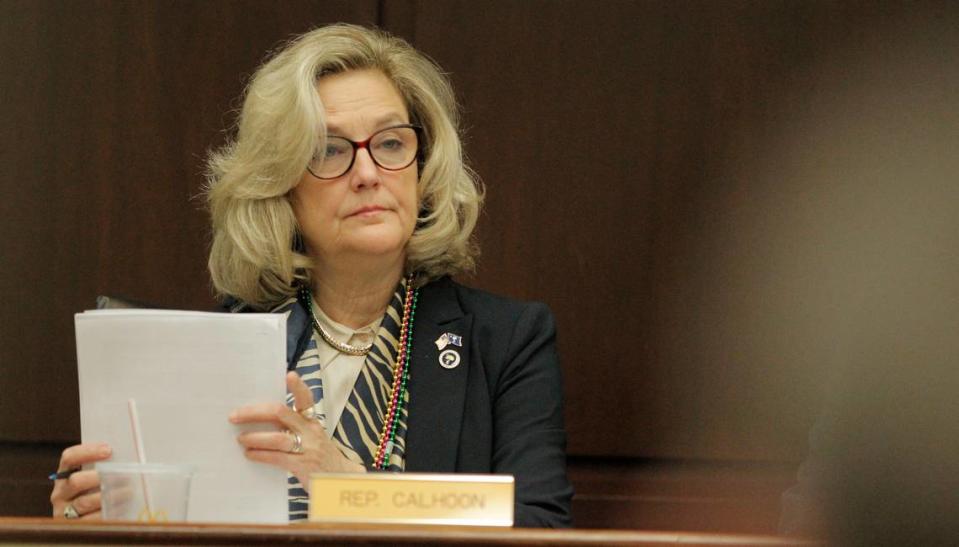
Freedom Caucus amendments to keep the Arts Commission and state universities from receiving more money in the budget and shift more dollars towards bridge repairs and more money for sheriff’s deputies failed earlier this year during a budget debate.
Freedom Caucus members fought for medical freedom bills and amendments on the health agency merger bill, only to be shut down.
When those proposals are defeated, Freedom Caucus members portrayed it as Republican leadership refusing to listen to conservative voices.
“The main tactic has been good policy,” Cromer said, “Good policy makes good politics. We get to run on our record, as opposed to most of the incumbents and challengers they’re actually running from their record” Cromer said.
The primaries highlight the infighting in a different way than could be shown through arguments on the House floor.
The Freedom Caucus’ modus operandi has become quite clear in the State House. But to the rest of the state of South Carolina, is there that distinguishable of a difference?
Karyn Amira, political science professor at College of Charleston, said the average voter probably doesn’t fully pick up on the fracture within the Republican Party, when people are more familiar with national figures, such as U.S. Rep. Marjorie Taylor Greene, R-Georgia.
“They might understand that those individuals tend to be fighting within the establishment part of their party,” Amira said. “But in terms of caucuses, there’s no polling that I know of whether people understand caucuses and factions within parties.”
In the Upstate race between Freedom Caucus member April Cromer and her opponent Kyle White, the two clash on Twitter. They emphasize to voters of the differences within the Republican Party.
Cromer said her voting record stands for itself, she’s a true conservative, which makes her different from White.
“He is running as a conservative, but yet he wants to come to Columbia and just be the mouthpiece for the speaker and all the other people in the establishment, where I am the voice for people in District Six.”
She doesn’t see similarities in their policies, because White is running on lies, she said.
Both Cromer and White say they support small businesses, are anti-abortion and support of the Second Amendment on their campaign websites.
White said he “draws the line,” at extremism, which he referred to as Cromer’s decision to vote for convicted felons being able to carry firearms and her signing onto a bill that would define an “unborn child who is a victim of homicide” equal protection under the homicide laws of the state.
White, however, said he can see a lot of things that they generally agree on to a point.
“The way that I like to think about myself versus April is I subscribe more to a common sense conservative type of mentality and I think her views and policies are significantly more extreme than my own,” White said. “I think April and some other folks in the Freedom Caucus are carrying out sort of an agenda that’s prescribed to them by a central command and it doesn’t necessarily have to do with bringing resources back to the district.”
